11 Best Gravity Forms Alternatives in WordPress 2026
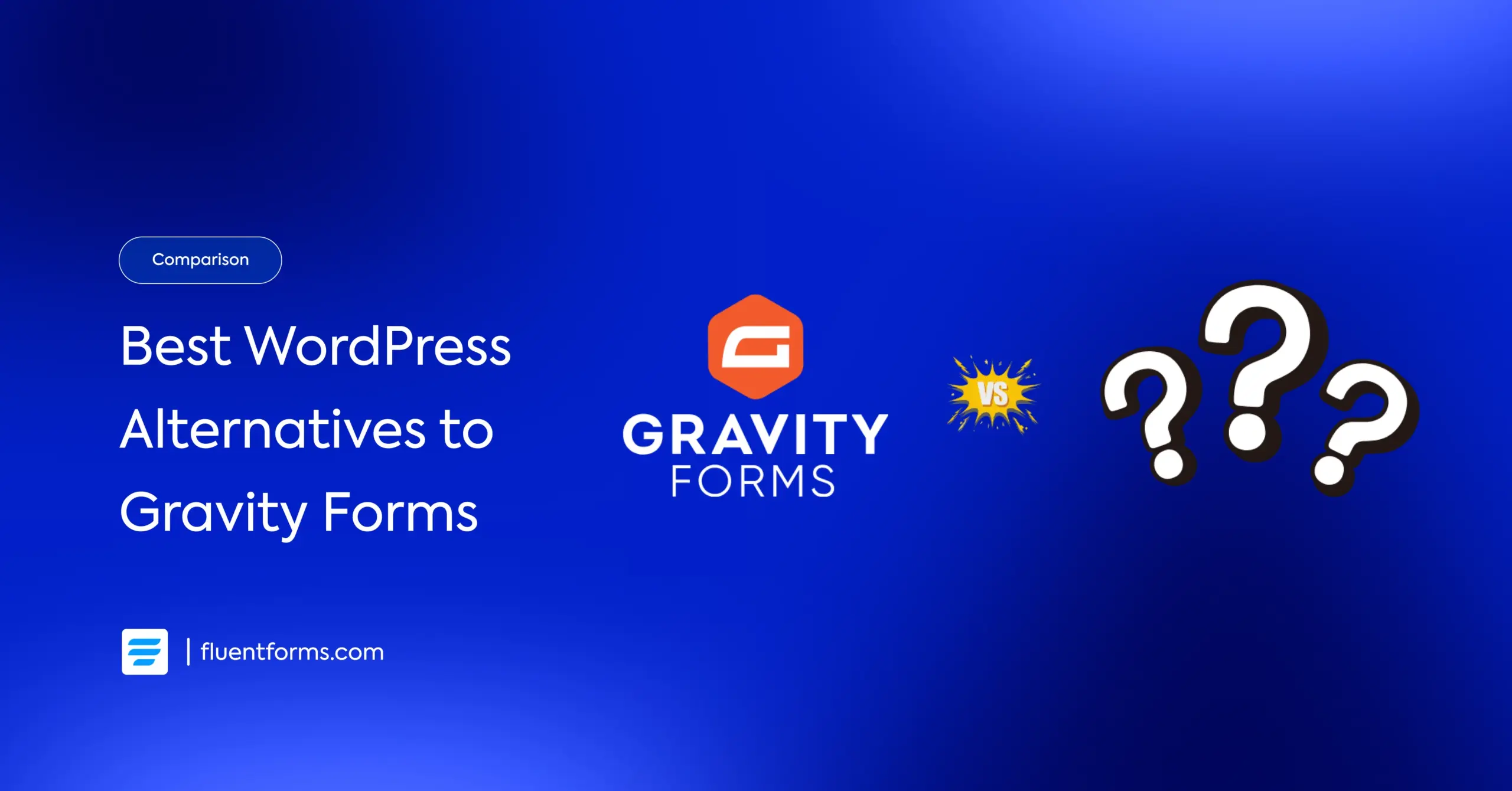
If you’ve been around WordPress for a while, you’ve probably seen countless people in forums and Facebook groups asking for Gravity Forms alternatives. I noticed this trend myself – and out of curiosity, I decided to dive deep.
Gravity Forms has built a loyal community over the years. It’s powerful, stable, and incredibly extensible. But let’s be honest – it’s not the most affordable tool once you start adding paid add-ons. Many features that feel standard elsewhere often need separate purchases here.
That’s why more users, from freelancers to small business owners, are exploring other options. Form builders that do more out of the box, feel faster to work with, and don’t charge extra for every small feature.
In this guide, I’ve compiled 11 strong Gravity Forms alternatives worth trying in 2025. These aren’t ranked – each fits different workflows and user types.
TL;DR
- Gravity Forms is powerful but heavily dependent on third-party add-ons.
- Most alternatives offer more built-in features for free or at lower costs.
- WordPress contact plugins like Fluent Forms, Formidable Forms, and Forminator provide faster UI and broader functionality without bloating your site.
- Lifetime plans from some builders can save you significant long-term costs.
- Gravity Forms still makes sense for developers or agencies deep in its ecosystem – but casual users and small businesses can often find more value elsewhere.
Why users look for Gravity Forms alternatives
There’s no denying that Gravity Forms paved the way for modern WordPress form builders. Its conditional logic, multi-page forms, and large add-on library set early standards for what users expected.
But the landscape has changed.

Today, users look for form builders that are:
- Faster and more intuitive
- Less dependent on add-ons
- Affordable with a free tier or lifetime license
- Visually flexible with built-in styling
- Lightweight without sacrificing features
Here’s what users (and I) often find limiting with Gravity Forms:
- No free version – you can’t test before you buy
- Many essential features (like payments or analytics) locked behind add-ons
- UI feels dated compared to modern builders
- Requires custom CSS for styling
- No lifetime pricing – renewals are yearly
That’s why alternatives have gained ground. They’re faster, cleaner, and deliver more power straight out of the box.
Gravity Forms Alternatives: At a Glance
Plugin | Key Features | Ideal For | Pricing |
Fluent Forms | Fast, native WordPress UI; payments; 60+ integrations | Teams wanting speed, full control, and no add-ons | Free + From $79/year |
Bit Form | Drag-and-drop builder; 50+ integrations; multi-step forms | Freelancers, startups, and automation-focused users | Free + From $39/year |
WS Form | Advanced grid system; developer hooks; full responsive control | Developers needing technical depth and precision | Free + From $59/year |
Formidable Forms | Display entries as tables/charts; calculated fields; data-driven logic | Power users building apps or directories | Free + From $79year |
Everest Forms | Simple drag-and-drop; multi-step support; conditional logic | Beginners who want lightweight forms | Free + From $69/year |
Ninja Forms | Modular add-ons; easy editor; payment support | Users wanting flexibility and smooth UX | Free + From $99/year |
HappyForms | Built in Customizer; visual editing; lightweight | Quick setups, small sites, or portfolios | Free + From $89/year |
MetForm | Elementor-based builder; 40+ templates; full design freedom | Elementor users focused on design control | Free + From $39/year |
Quill Forms | Conversational layout; question-by-question flow | Engaging surveys or feedback forms | Free + From $99/year |
Forminator | Forms, quizzes, polls, and payments; built-in automation | Websites experimenting with interactive forms | Free + Pro via WPMU DEV membership |
JetFormBuilder | Gutenberg-based; dynamic fields; calculated logic | Developers using JetPlugins or Gutenberg | Free + Pro add-ons from $49/year |
Fluent Forms
Fluent Forms is a lightweight WordPress plugin built for speed, flexibility, and full control. It’s designed to feel native inside WordPress, meaning you don’t rely on third-party servers or external dashboards. Developers and non-technical users alike appreciate its clean interface and real-time preview. If you want fast forms that live entirely on your own site, Fluent Forms is a strong choice.
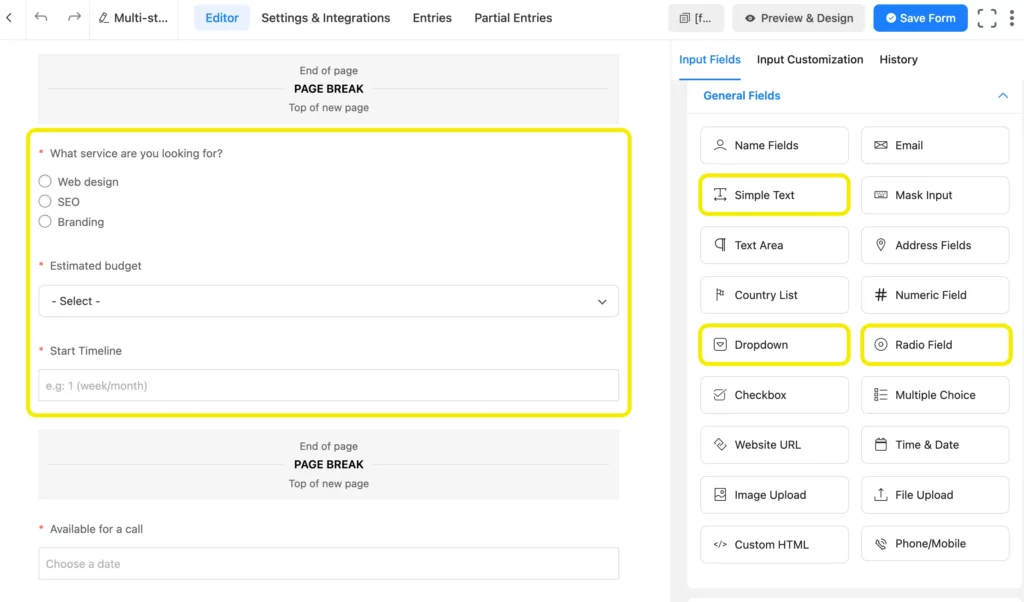
Key features
- Drag-and-drop builder with real-time preview
- 70+ pre-built templates
- Free version of Conversational forms
- Built-in payment support for Stripe, PayPal, Mollie, Razorpay,Paddle, Paystack, Authorize.net and Square
- Advanced conditional logic and calculated fields
- 60+integrations
- Built-in spam protection and analytics dashboard
Compared to Gravity Forms
Fluent Forms packs most of what Gravity Forms offers – without the need for dozens of add-ons. You get logic, payments, integrations, and reporting built-in. I find the experience faster and smoother, especially on large forms. For teams that prefer staying within WordPress and want everything included from the start, Fluent Forms is the easier, more affordable pick.
Pricing: Free version available; premium plans start at $79/year.
Bit Form
Bit Form is a modern WordPress form builder focused on simplicity and smooth automation. It stays lightweight with a clean interface that works well for beginners and small teams. With built-in integrations like Google Sheets and popular CRMs available for free, it helps you move data easily without extra add-ons. If you want an affordable form builder that keeps things efficient, Bit Form is a practical choice.
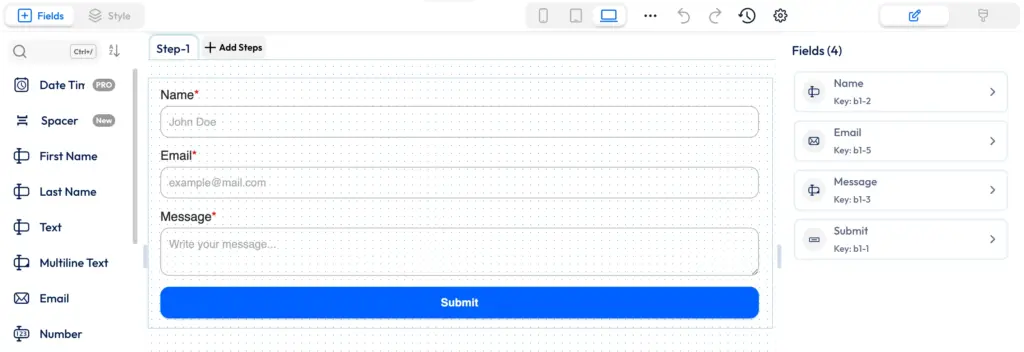
Key features
- Fast and modern drag-and-drop builder
- 50+ integrations including CRMs, Google Sheets, and email tools
- Conditional logic and multi-step forms
- Payment gateways and webhook support
- Export/import functionality for easy migration
Compared to Gravity Forms
Bit Form feels like the lightweight, automation-ready counterpart to Gravity Forms. It skips the heavy add-on model and gives you built-in integrations that many users only get in higher Gravity Forms tiers. It’s simpler, faster to set up, and far more affordable. You don’t get the enterprise depth Gravity Forms is known for, but if your focus is smooth onboarding, easy data syncing, and low-cost automation, Bit Form becomes a very practical alternative.
Pricing: Starts free on WordPress.org, and premium plans begin at $39/year. You get lifetime deals occasionally, which makes it even more affordable.
WS Form
WS Form is a performance-focused WordPress form builder known for its precision and control. It’s ideal for users who want deep technical customization while maintaining an intuitive drag-and-drop interface. Every small setting – from responsive layouts to data handling – is adjustable, giving developers full flexibility.
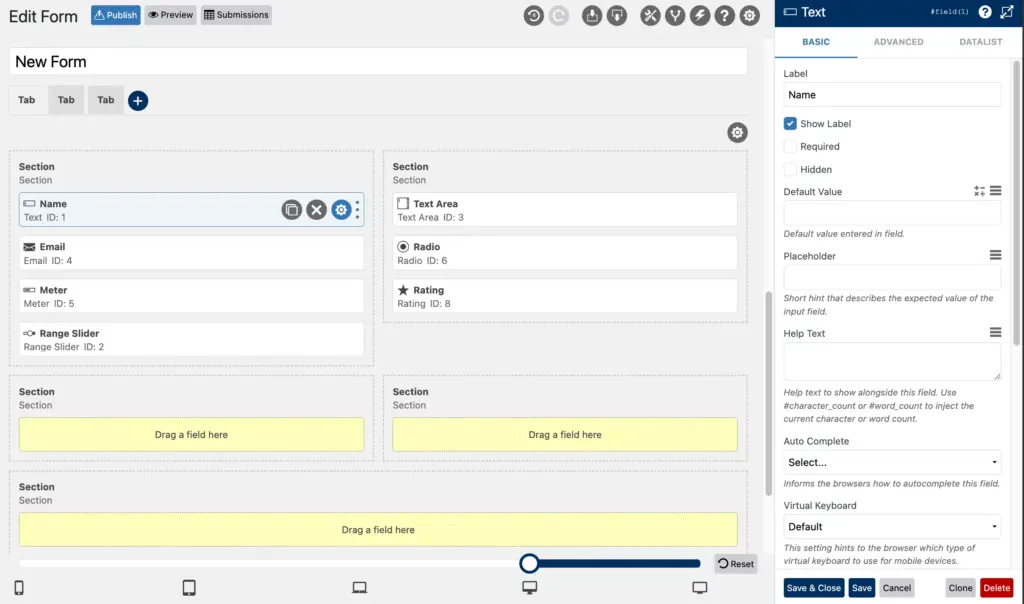
Key features
- Advanced responsive grid layout
- Developer-friendly with conditional logic and hooks
- Built-in debugging console
- Repeatable sections, calculations, and custom breakpoints
- Native integrations with WooCommerce, Mailchimp, and 30+ other tools
- Cloudflare Turnstile CAPTCHA for spam prevention
Compared to Gravity Forms
WS Form feels like Gravity Forms for power users – but without the hassle of juggling add-ons. It’s cleaner and faster, yet far more detailed under the hood. That said, beginners might find the setup intimidating at first. For developers, though, it’s a huge step up in performance and customization freedom.
Pricing: Starts at $59/year for one site.
MetForm
MetForm is built specifically for Elementor users. It brings complete form-building capability directly into Elementor’s interface, giving design-focused users total layout control.
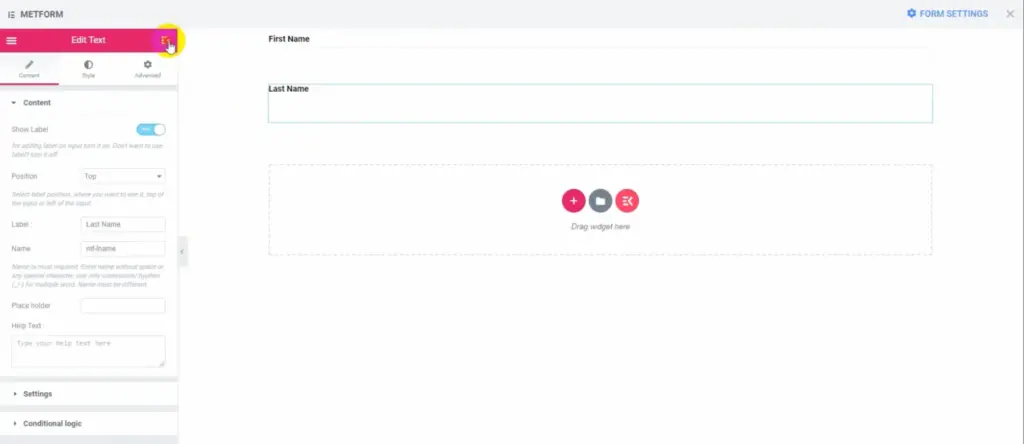
Key features
- Elementor-native interface
- 40+ pre-designed templates
- Full Elementor widget integration
- Conditional logic and field validation
- Integration with Slack, Mailchimp, and CRM tools
- Responsive and translation-ready
Compared to Gravity Forms
If your site runs on Elementor, MetForm feels like part of the same ecosystem. The design freedom is unmatched. Gravity Forms can’t touch that level of front-end flexibility. But if you switch builders, you’ll lose that smooth workflow – it’s very Elementor-dependent.
Pricing: Free version available; pro starts at $39/year.
Formidable Forms
Formidable Forms is a data-focused form builder designed for projects that go beyond collecting submissions. It lets you transform entries into front-end views, directories, or charts – ideal for building applications with form data.
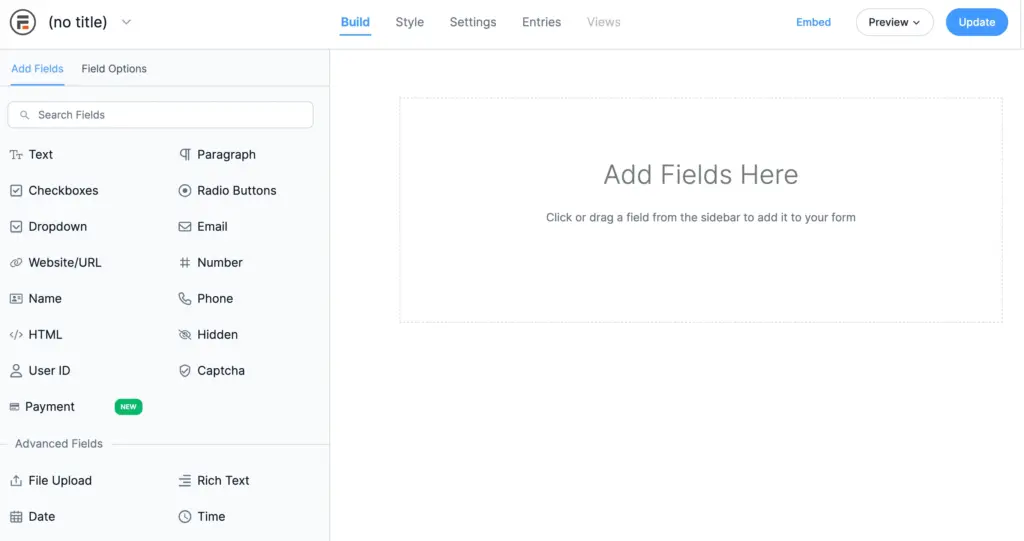
Key features
- Advanced form-to-view system
- Advanced calculations and repeater fields
- Multi-step forms with progress indicators
- Integration with payment gateways and CRMs
- Form appearance customization
- Display submissions on the front-end (tables, charts, directories)
Compared to Gravity Forms
Formidable Forms leans heavily toward developers. You can do far more with your data – but it takes a little learning. Gravity Forms can’t natively match that flexibility without multiple add-ons. For data-driven websites, Formidable is the smarter long-term tool.
Pricing: Free version available; premium plans start at $79/year.
Everest Forms
Everest Forms is a beginner-friendly WordPress plugin that focuses on simplicity, speed, and an easy drag-and-drop experience. It includes all the essentials for building clean, responsive forms without complexity.

Key features
- Easy drag-and-drop builder
- Pre-built templates for contact, registration, and survey forms
- Email notifications and spam protection
- Multi-step forms
- Conditional logic and file uploads
- Style customizer for branding and layout control
- Custom Q&A-based CAPTCHA or math equations for security
Compared to Gravity Forms
If you’ve ever felt Gravity Forms was too bulky for simple needs, Everest Forms feels refreshing. It’s lightweight and straightforward, covering most everyday use cases. But for deeper automations or complex workflows, Gravity Forms still wins.
Pricing: Free version available; pro starts at $69/year.
Ninja Forms
Ninja Forms is one of the earliest WordPress form builders, still going strong. It’s built for flexibility and accessibility, offering a modular add-on system for extending functionality as you go.
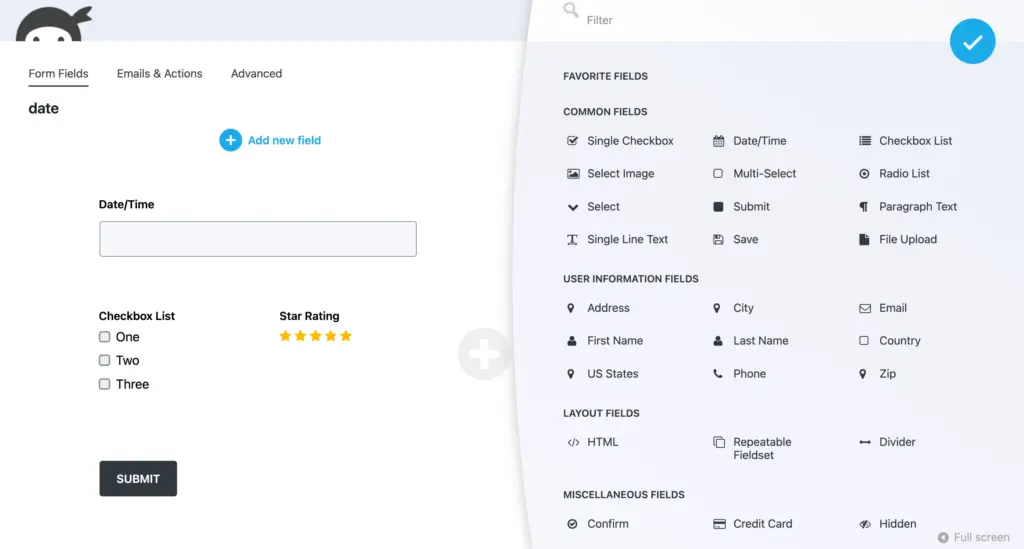
Key features
- 25+ input fields
- Modular add-on system
- Clean, drag-and-drop interface
- Payment integrations (Stripe, PayPal)
- Conditional logic and file uploads
- SEO and mobile-friendly design
- Form export/import options
Compared to Gravity Forms
Ninja Forms shares Gravity’s add-on model – and the pricing can add up fast. But its interface feels smoother and better integrated into WordPress. If you like control over what you install but prefer a modern UI, Ninja Forms strikes a balance.
Pricing: Free version available; premium starts at $99/year.
HappyForms
HappyForms is designed for simplicity. It lives inside the WordPress Customizer, allowing you to build and preview forms in real time. Lightweight, fast, and visually consistent with your theme.
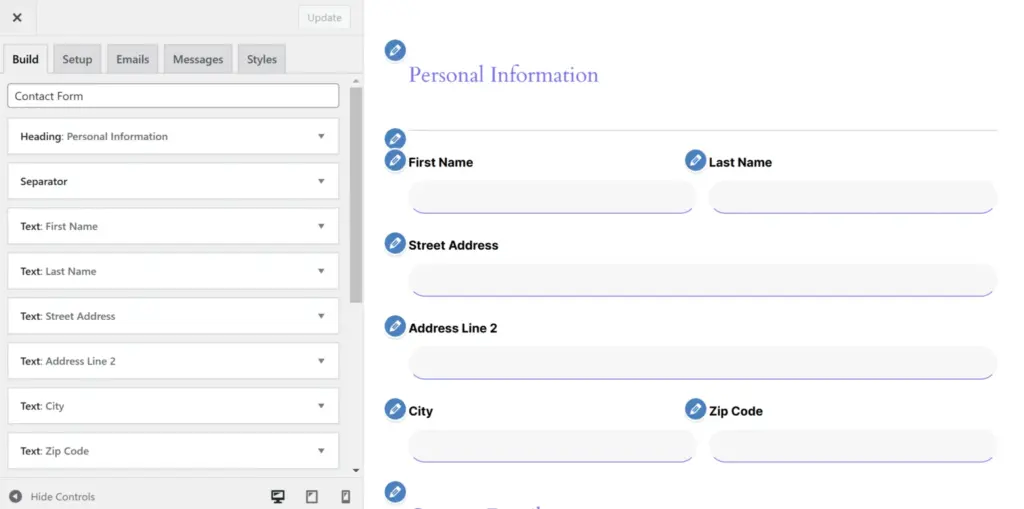
Key features
- Visual editing inside the Customizer
- Conditional logic and multi-step forms
- Drag-and-drop interface with live preview
- Spam protection and email notifications
- Fully responsive design
Compared to Gravity Forms
HappyForms is the opposite of Gravity Forms – minimal, clean, and quick. It’s perfect for small sites or portfolios that need forms but not heavy automation. I like how fast it is to set up, but it’s not meant for advanced integrations or workflows.
Pricing: Free version available; premium starts at $89/year.
Quill Forms
Quill Forms delivers a Typeform-like experience right inside WordPress. It’s focused on conversational, one-question-at-a-time interactions that keep users engaged.
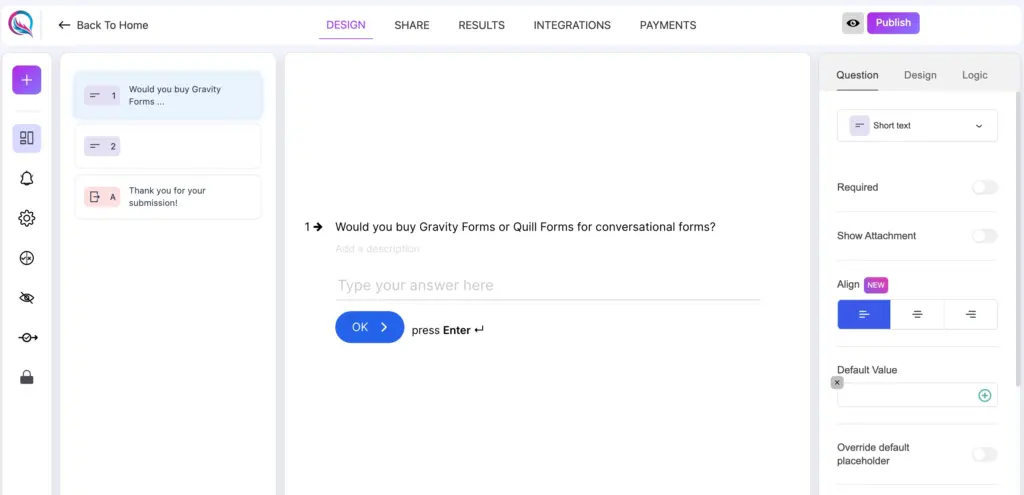
Key features
- Conversational, chat-style layouts
- Drag-and-drop question builder
- Integration with Slack, Mailchimp, and Zapier
- Custom themes and animation options
- Built-in analytics
Compared to Gravity Forms
Quill Forms wins on user experience. It makes filling forms feel natural and human – great for surveys and feedback collection. Gravity Forms feels static in comparison. But Quill isn’t ideal for backend-heavy use cases or large data collection.
Pricing: Free version available; pro starts at $99/year.
Forminator
Forminator by WPMU DEV is an all-in-one form builder that covers everything – contact forms, quizzes, polls, and payment forms – in one interface.
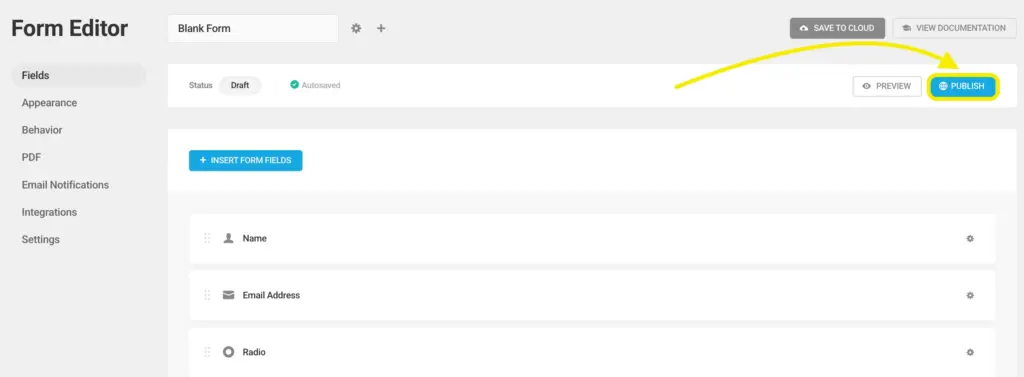
Key features
- Quizzes, polls, and calculators
- Payments via Stripe and PayPal
- Third-party integrations (HubSpot, Trello, Mailchimp, etc.)
- Custom CSS, calculations, and conditional logic
- GDPR-ready and API-friendly
Compared to Gravity Forms
Forminator gives away a lot for free – including payments, which Gravity Forms keeps behind paywalls. It’s a strong all-rounder, though a bit heavier on resource load. I like it for sites experimenting with interactive content or gamified forms.
Pricing: Free version available; pro included with WPMU DEV membership.
JetFormBuilder
JetFormBuilder is part of the Crocoblock suite, built for block-based form creation. It’s powerful, dynamic, and perfect for developers using Gutenberg and JetEngine.
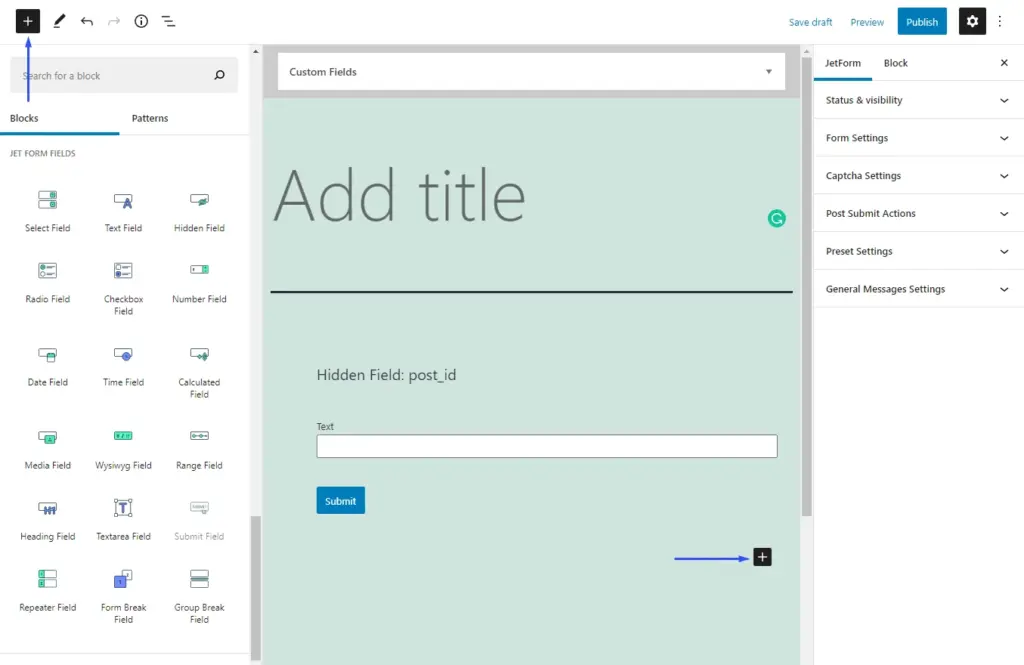
Key features
- Native Gutenberg block editor
- Dynamic fields and conditional logic
- Multi-step forms and progress bars
- Payment support (Stripe, PayPal, WooCommerce)
- 12+ post-submit actions and full control over entry handling
Compared to Gravity Forms
JetFormBuilder feels like a modern rebuild for Gutenberg power users. You can build advanced workflows directly within blocks. It takes time to learn, but it offers a level of control Gravity Forms can’t match natively.
Pricing: Free version available; pro add-ons start at $49/year.
Loved the comparison? Check out this blog to find the best google form alternatives if you’re struggling to choose one.
Final thoughts
Gravity Forms deserves credit for setting the early standards of WordPress form building. But times have changed, and users now want lighter, faster tools with fewer dependencies.
If you want a fast, all-in-one form builder with full data ownership, Fluent Forms is the most balanced choice.
If you’re building complex, data-driven projects, Formidable Forms or Forminator make strong contenders.
For developers seeking deeper customization, WS Form or JetFormBuilder offer the most technical control.
And if you just want simple, clean forms for everyday use, Everest Forms, Ninja Forms, Bit Form or HappyForms will fit perfectly.
In short, Gravity Forms remains dependable – but modern WordPress alternatives now offer the same power with more speed and less friction.
Did I miss any prominent form builder? Or want me to test some other tools and provide reviews like this? Drop your comments below!


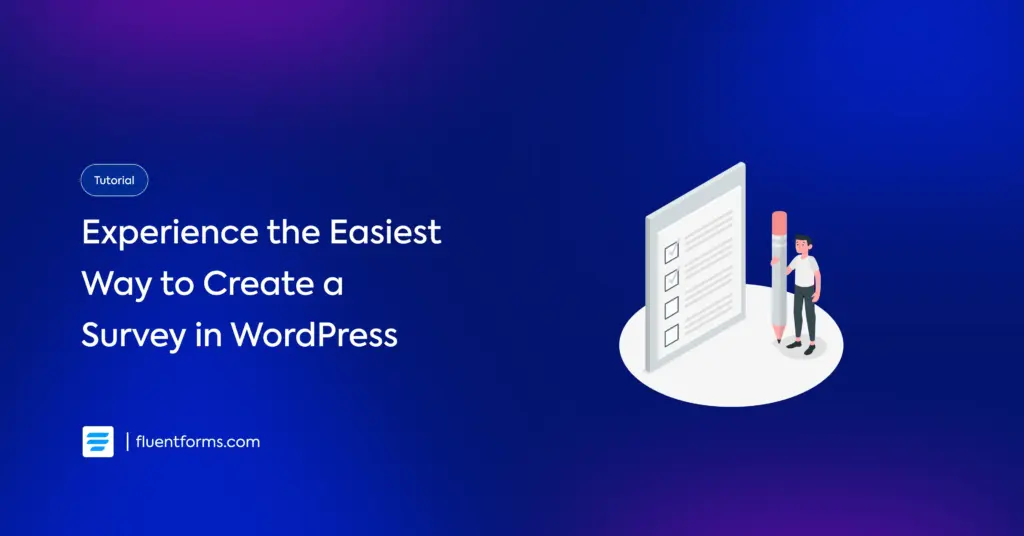





Leave a Reply